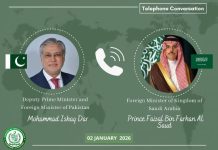ISLAMABAD, FEB 27 (DNA) – It is a real honor to inaugurate this important conference and I am particularly pleased by the involvement of PUAN (Pakistan-U.S. Alumni Network). I find members of our alumni network almost everywhere I go in Pakistan and doing all kinds of important work. And I am always proud when I see it.
Human trafficking is an appalling and pervasive crime. It deprives millions worldwide of their dignity and freedom. It is a global crisis that touches every country, including Pakistan and the United States.
By its nature, the crime of human trafficking is often hidden from view. While the real numbers are hard to confirm, an estimated 27.6 million people around the world are victims of human trafficking, including millions of women and children. Beyond the harm to individual victims, trafficking-in-persons also undermines national security, distorts markets, enriches transnational criminals and terrorists, and is an affront to our universal values.
These statistics are alarming – but we need to go beyond the numbers and humanize this danger by understanding the experiences of survivors and engaging with those who are actively fighting against this transnational crime.
We will hear today from Ansa Noreen – one of the two American experts joining us today – herself a trafficking survivor. Her story could have ended in tragedy. However, through the coordinated efforts of stakeholders like you, she was eventually freed, and she stands before you today as a tireless advocate for trafficking victims.
We are also going to hear from Joseph Salavarria, a retired Special Agent from the U.S. Department of Homeland Security. He has more than 20 years of criminal investigative experience focused on human trafficking and human smuggling. Mr. Salavarria will share his expertise on the efficacy and necessity of stakeholder collaboration in addressing this transnational crime.
In the United States, we follow the widely used “3P” paradigm — prosecution, protection, and prevention – and I am glad to see that it is universalized here as well — to combat human trafficking worldwide. In addition, the Department of State employs a “4th P” — for partnership — as a complementary means to achieve progress and enlist all segments of society in the fight against human trafficking. The U.S. Embassy’s ongoing grant program with the Sustainable Social Development Organization is a testament to the effectiveness of meaningful partnerships between civil society and the public sector, demonstrating how we can expand awareness, leverage expertise, and facilitate creative solutions when we work together.
The toll of human trafficking is borne disproportionately by its survivors; however, it would be a mistake to dismiss the impact it has on all of society. Human trafficking erodes the rule of law, the safety of our communities, the security of our borders, and the strength of our economy. The severity and pervasiveness of this issue demands our collective action. Working together — across government, business, and civil society — is essential in our joint effort to create a fairer and more equitable world.
We are making progress, but there is still a lot of work remaining to do. Through this conference, I hope to see partnerships develop and opportunities for further collaboration explored. Together, we can increase awareness of the risks and consequences of human trafficking, strengthen Pakistan’s capacity to identify and investigate trafficking crimes, and share best practices in assisting and protecting survivors.
The U.S. Embassy and the U.S. Government is committed to supporting Pakistan’s efforts in addressing this critical human rights issue. So thank you everyone for being here today.

















